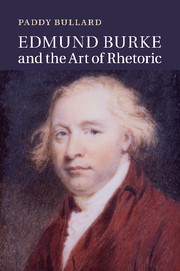Book contents
- Frontmatter
- Contents
- Acknowledgements
- Abbreviations
- Introduction: Burke, rhetoric and ethics
- 1 The ethical turn in early modern rhetoric, 1600–1760
- 2 Rhetoric in Ireland, 1693–1765
- 3 The Epicurean aesthetics of the Philosophical Enquiry
- 4 Episodes in the evolution of Burke's eloquence
- 5 Reflections on the Revolution in France and the rhetoric of character
- 6 Burke, Rousseau and the purchase of eloquence
- Conclusion
- Notes
- Bibliography
- Index
1 - The ethical turn in early modern rhetoric, 1600–1760
Published online by Cambridge University Press: 01 June 2011
- Frontmatter
- Contents
- Acknowledgements
- Abbreviations
- Introduction: Burke, rhetoric and ethics
- 1 The ethical turn in early modern rhetoric, 1600–1760
- 2 Rhetoric in Ireland, 1693–1765
- 3 The Epicurean aesthetics of the Philosophical Enquiry
- 4 Episodes in the evolution of Burke's eloquence
- 5 Reflections on the Revolution in France and the rhetoric of character
- 6 Burke, Rousseau and the purchase of eloquence
- Conclusion
- Notes
- Bibliography
- Index
Summary
ETHOS IN EARLY MODERN RHETORIC
Surveying the landscape of the sciences in the second book of The Advancement of Learning (1605), Francis Bacon notices a conspicuously neglected field of knowledge, an area of study apparently left derelict by the learned. It is the ground of the science ‘which considereth of the APPETITE and WILL OF Man’, and it lies right next to the well-cultivated gardens of rhetoric (so ‘excellent, and excellently well laboured’). The ground is derelict, he conjectures, because learned people ‘have despised to be conuersant in ordinary and common matters’ such as practical ethics. Eloquence itself, and the pride of learned ambition, has drawn intellectuals away from the sort of inquiry that would be most useful to their public discourses, and from the sort of prudential morality based on the empirical or historical study of human behaviour. As a first step towards restoring the science of the ‘Culture and Cure of the Mynde of Man’, Bacon isolates two factors that are beyond the command of the subject: points of fortune (the basis of which is inscrutable) and ‘Poyntes of Nature’ – that is, ‘the seueral characters & tempers of mens Natures and dispositions specially hauing regard to those differences which are most radicall in being the fountayns and Causes of the rest’. He calls for a systematic categorization of the varieties of human disposition, and the only precedent he can think of for this kind of anatomy of character is the treatment of ethos ‘by Aristotle as in passage in his Rhetoricks’.
- Type
- Chapter
- Information
- Edmund Burke and the Art of Rhetoric , pp. 25 - 51Publisher: Cambridge University PressPrint publication year: 2011



